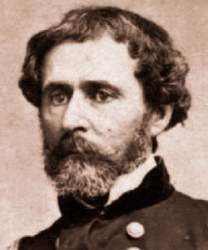Record Data
Transcription
HEAD-QUARTERS, WESTERN DEPARTMENT.
ST. LOUIS, Aug 30, 1861.
CIRCUMSTANCES in my judgment are of sufficient urgency to render it necessary that the commanding General of this department should assume the administrative powers of the State. Its disorganized condition, helplessness of civil Minority and the total insecurity of life, and devastation of property by bands of murderers and marauders, who infest nearly every county in the State, and avail themselves of public misfortunes, in the vicinity of a hostile force, to gratify private and neighborhood vengeance, and who find an enemy wherever they find plunder, finally demand the severest measures to repress the daily increasing crimes and outrages, which are driving off the inhabitants and ruining the State.
In this condition, the public safety and success of our arms require unity of purpose, without let or hindrance to the prompt administration of affairs. In order, therefore, to suppress disorders, maintain the public peace, and give security to the persons and property of loyal citizens, I do hereby extend and declare established martial law throughout the State of Missouri. The lines of the army occupation in this State are for the present declared to extend from Leavenworth, by way of posts of Jefferson City, Rolla, and Ironton, to Cape Girardeau on the Mississippi River. All persons who shall be taken with arms in their hands within these lines shall be tried by court-martial, and if found guilty, will be shot. Real and personal property of those who shall take up arms against the United States, or who shall be directly proven to have taken an active part with their enemies in the field, is declared confiscated to public use, and their slaves, if any they have, are hereby declared free men.
All persons who shall be proven to have destroyed, after the publication of this order, railroad tracks, bridges, or telegraph lines, shall suffer the extreme penalty of the law. All persons engaged in treasonable correspondence, in giving or procuring aid to the enemy, in fermenting turmoil, and disturbing public tranquillity, by creating or circulating false reports, or incendiary documents, are warned that they are exposing themselves.
All persons who have been led away from allegiance, are required to return to their homes forthwith. Any such absence without sufficient cause, will be held to be presumptive evidence against them. The object of this declaration is to place in the hands of military authorities power to give instantaneous effect to the existing laws, and supply such deficiencies as the conditions of the war demand; but it is not intended to suspend the ordinary tribunals of the country, where law will be administered by civil officers in the usual manner, and with their customary authority, while the same can be peaceably administered.
The commanding General will labor vigilantly for the public welfare, and, by his efforts for their safety, hopes to obtain not only acquiescence, but the active support of the people of the country.
J. C. FREMONT,
Major-General Commanding.


